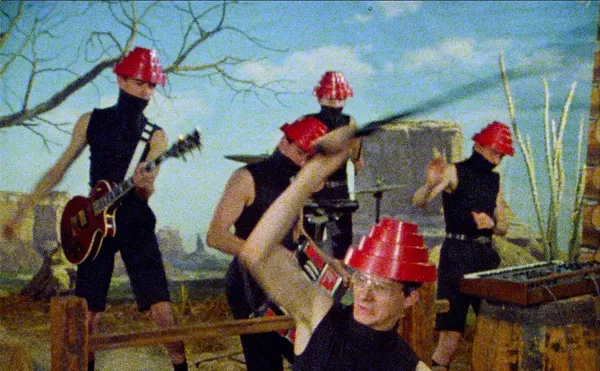What is it, precisely, that makes an icon? What's the recipe for fame and notoriety that will live on for generations? Physical beauty, tragedy, scandal, mystery, secrets ...
Bettie Page certainly had all those elements in her life, but her rise to cult legend status is still an oddity. Yes, she was beautiful, contradictory, scandalous and intoxicating — but why Bettie Page? What is it about her in particular that's made her a goddess to men and women alike who are young enough to be her grandchildren? In certain circles, she's more revered than Marilyn Monroe; her coquettishly playful visage has been permanently inked into the flesh of thousands of neo-James Dean bad-boy greasers; her signature bangs are worn by a virtual army of ersatz pinups, and serve as a marker of an entire subculture, like a "Bettie brand." She is, undoubtedly, more famous now than she was in her heyday.
But why?
If you're looking for the answer, you're not likely to find it in Mary Harron's sumptuous but ultimately misguided and superficial biopic of the queen of all pinups — but it does have some damn snazzy vintage underwear.
Harron's previous work (American Psycho, I Shot Andy Warhol) was dark, engaging and, at times, bitterly funny, so it's odd that she takes such a giant misstep with Page. The end result is almost an insult to the pinup's legacy, as Harron is more interested in waxing philosophical over the repressed sexuality and moral censorship of the 1950s, a well-trodden subject that's been tackled better elsewhere.
It's a wonder why she didn't focus more on Page's fascinatingly contradictory life: Here you have a sweet, pretty young farm girl who moved to the big city, stumbled into modeling, posed for numerous bondage photos that led to her being called before Senate hearings on obscenity; she found Jesus, disappeared at the pinnacle of her fame, pulled a knife on her landlady, spent more than a decade in an insane asylum, and then re-emerged to find she was more famous than ever. So it's disheartening to see Page take a backseat in her own biography.
One of Page's most powerful trademarks was her ear-to-ear grin. Where other pinups forced contrived, smoldering pouts, Page simply looked happy, like a schoolgirl without a care in the world — despite the abuse, trials and heartbreaks of her life. Harron gets that Page was happiest on camera, and homes in on her naiveté about the bondage photos: "They're just costumes." But it still rings hollow.
Thankfully, Gretchen Mol as Page gives it her all, and pulls off an engaging performance that desperately tries to flesh out the sweet little Southern girl's persona. The cinematic blogging world was alight with talk of the casting, and most balked at the idea of the slender, golden girl Mol as the dark pinup queen. Not to mention the fact that Mol's ass is so flat you could iron shirts on it, even with the numerous milkshakes she allegedly downed to round herself out to Bettie's legendary proportions. But Mol does a masterful job of emulating Page's charismatic facial expressions, and nails the curiously innocent ingenue element of her character.
There are some spot-on moments, particularly a scene when Page is posing for a bondage shoot and begins to wax poetic about loving Jesus after having a ball gag removed from her mouth. And visually, it's a stunningly beautiful and accurate depiction of a bygone era, from the immaculate vintage costuming to the steamy black-and-white visuals interlaced with bits of color.
The supporting cast is uneven; as Irving Klaw, the man who ended up in a heap of legal trouble for his bondage photos, Chris Bauer flubs his accent and overacts, and the always-wonderful Lili Taylor fares much better as his sister, Paula Klaw. There's even a cameo by David Strathairn, whose singular face truly belongs on black-and-white film.
But the film, overall, falls as flat as its spirited lead actress' derriere. It's fairly similar to the abysmally bad Bettie Page: Dark Angel, which went straight to DVD in 2004 — Notorious just has a bigger budget and better acting.
Bettie Page fans will no doubt flock to the film, and it's a capable enough stab at a biography, but one that truly doesn't do justice to its subject.
Bettie deserves better.
Showing at the Maple Art Theatre (4135 W. Maple Rd., Bloomfield Hills; 248-263-2111).
Sarah Klein is Metro Times culture editor. Send comments to [email protected].






